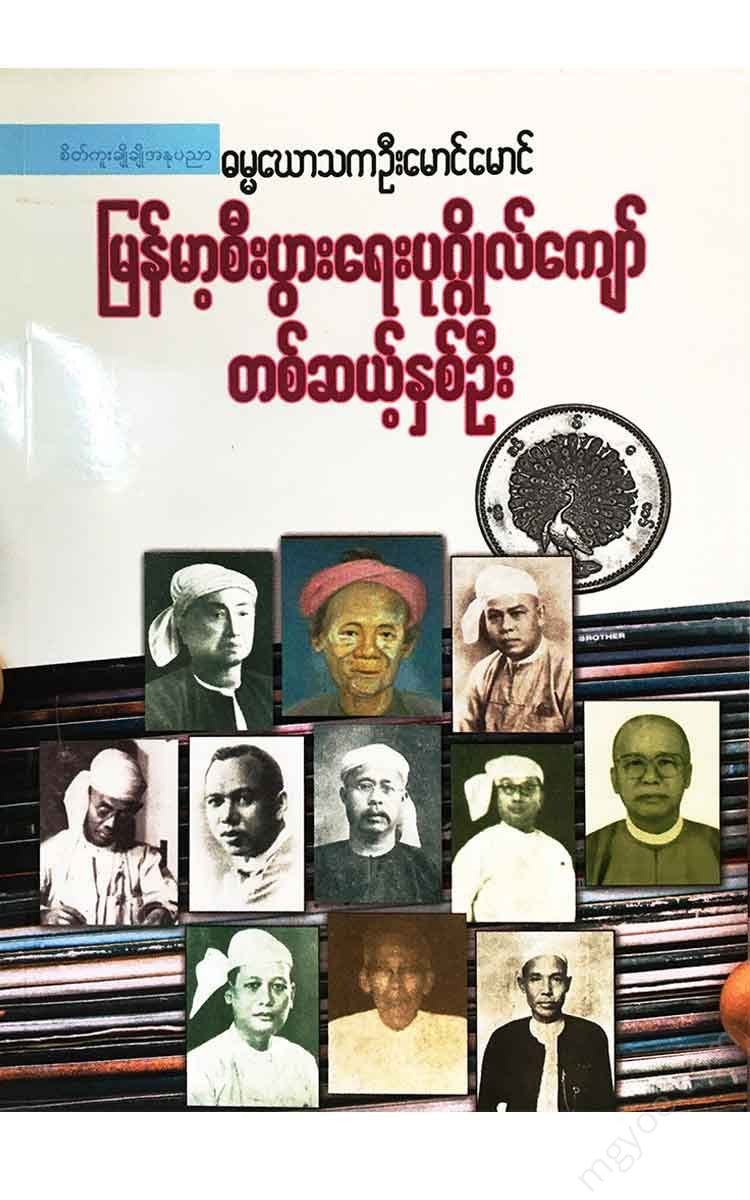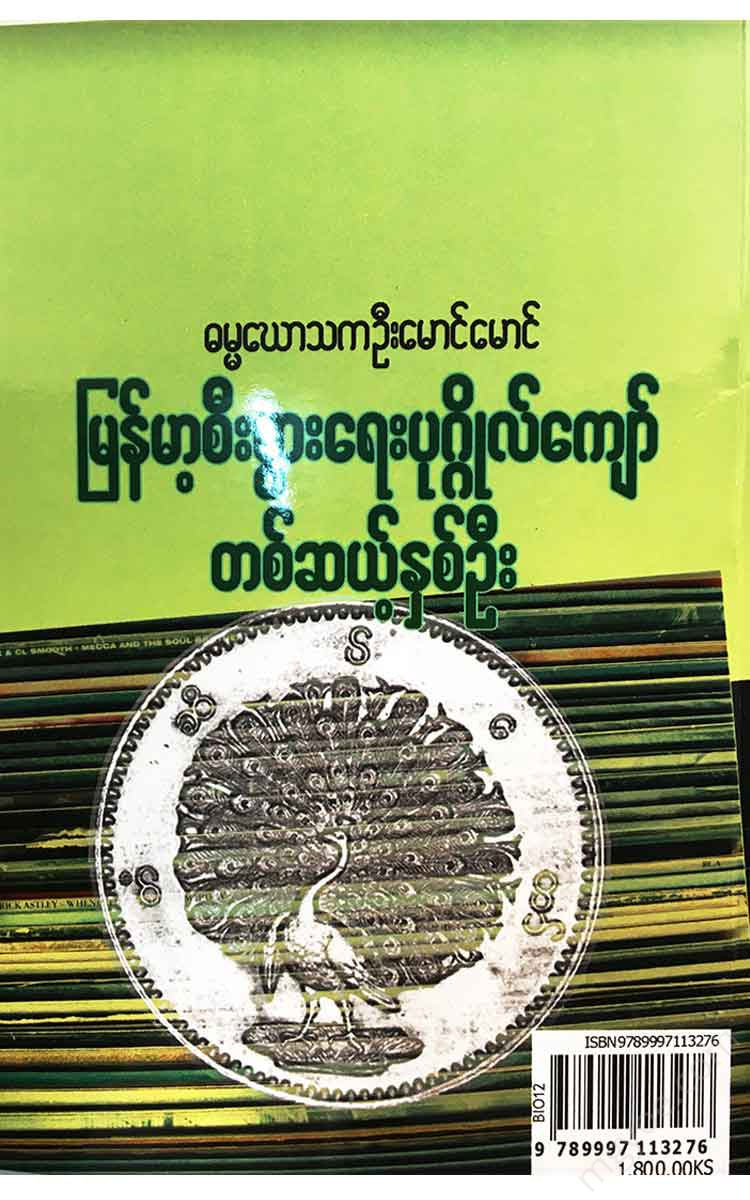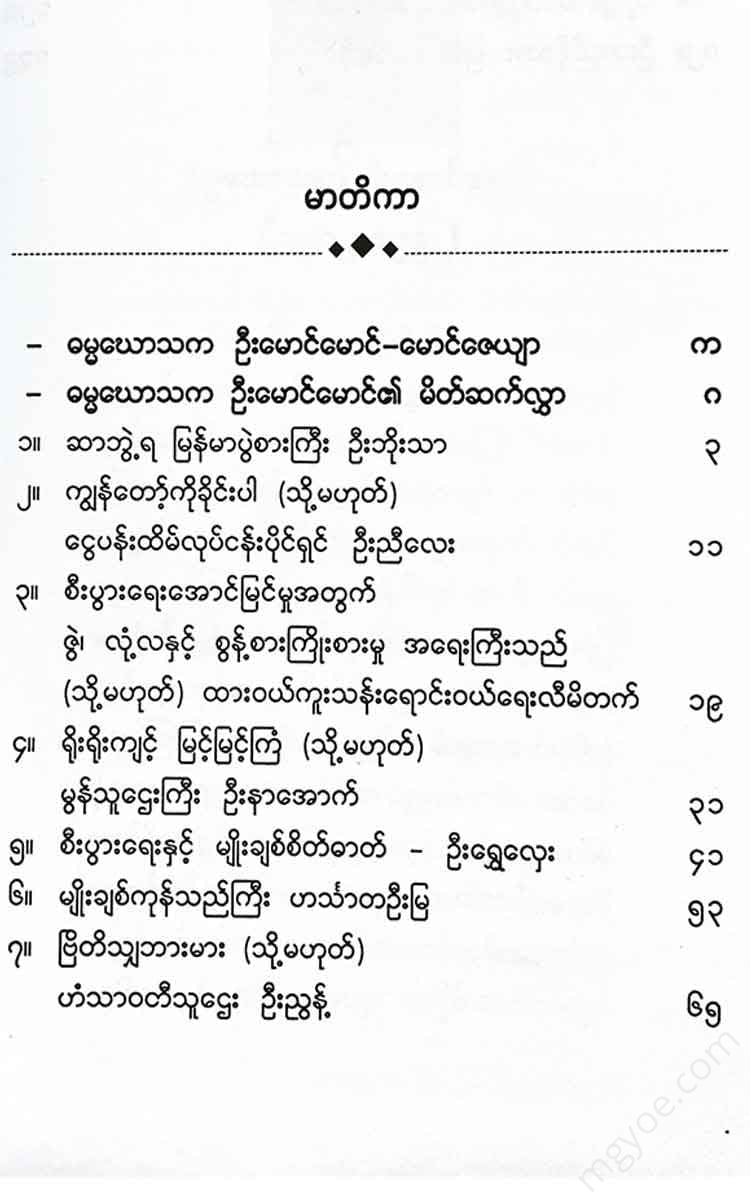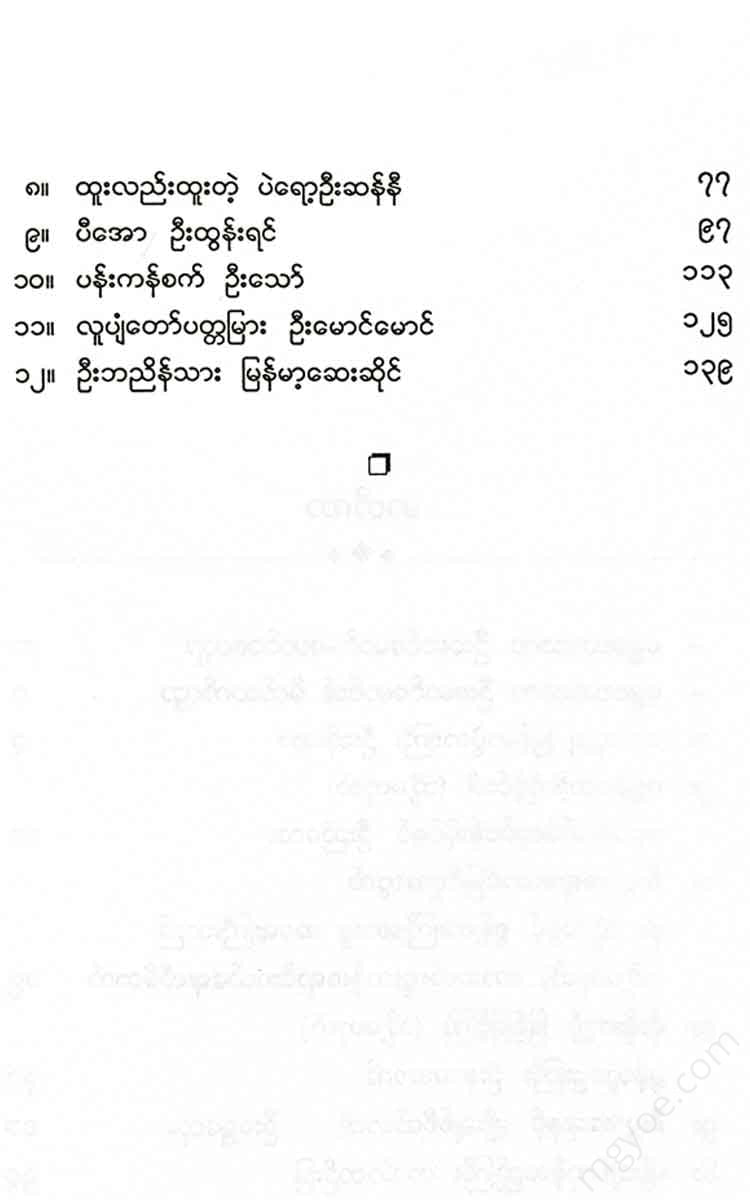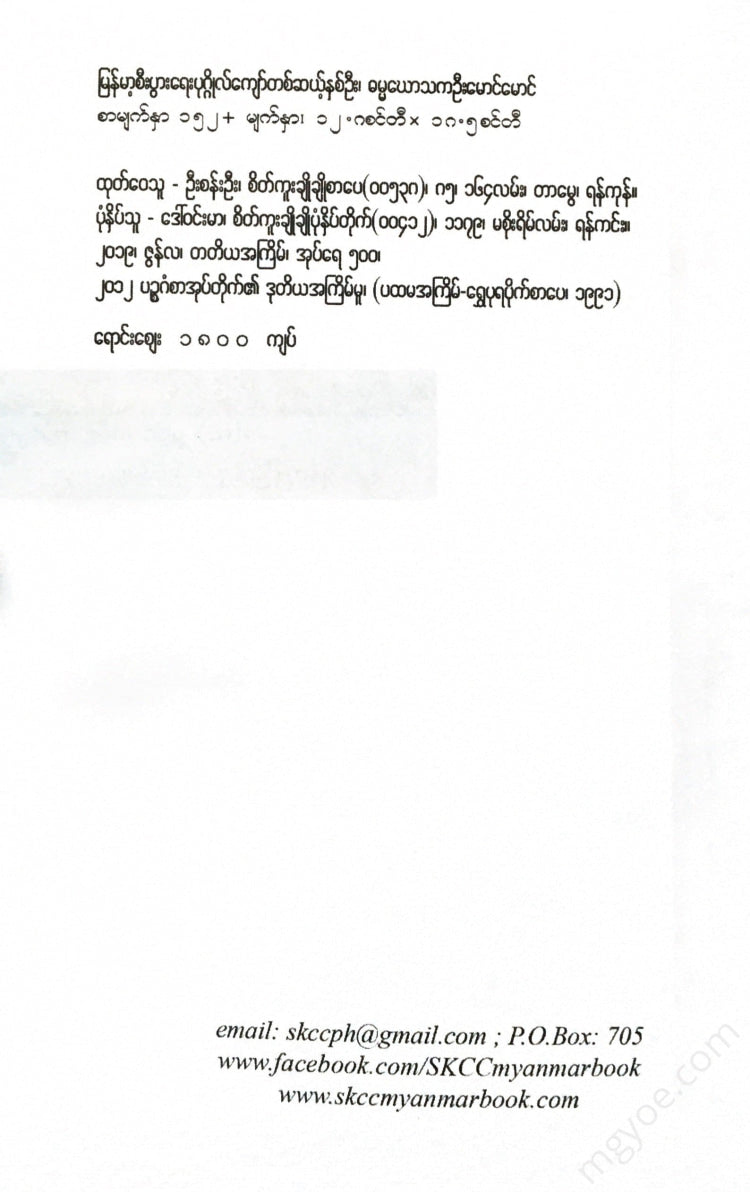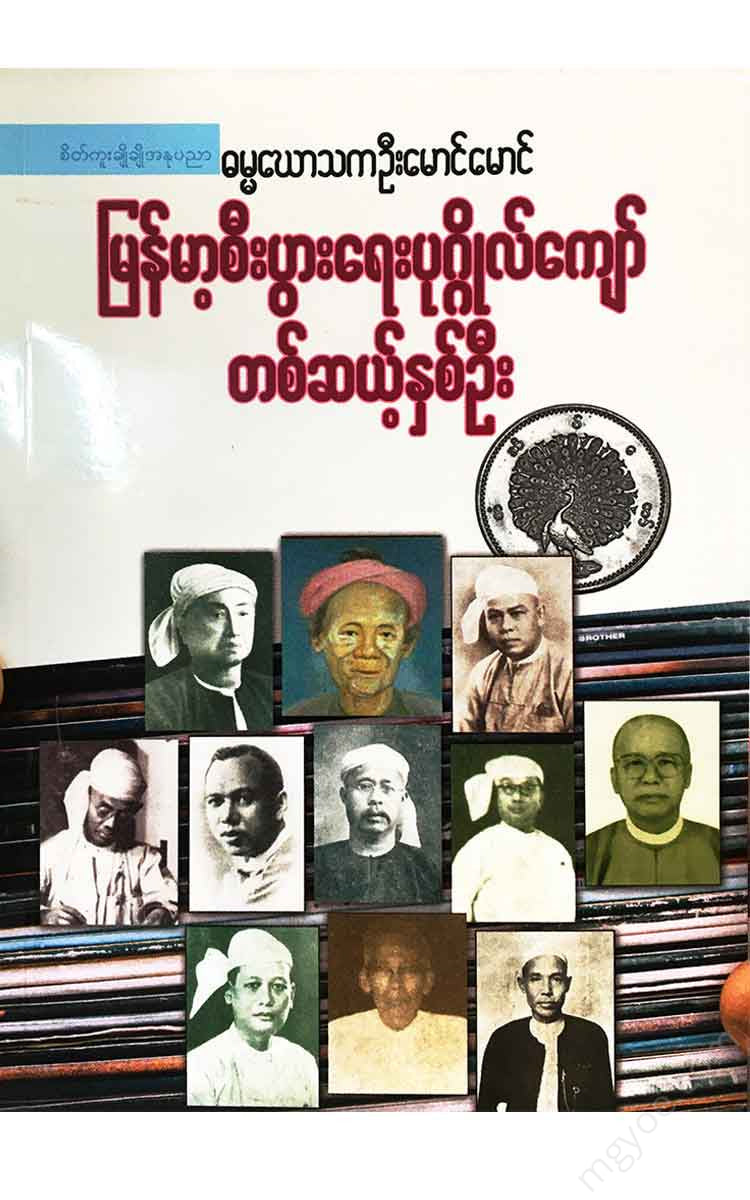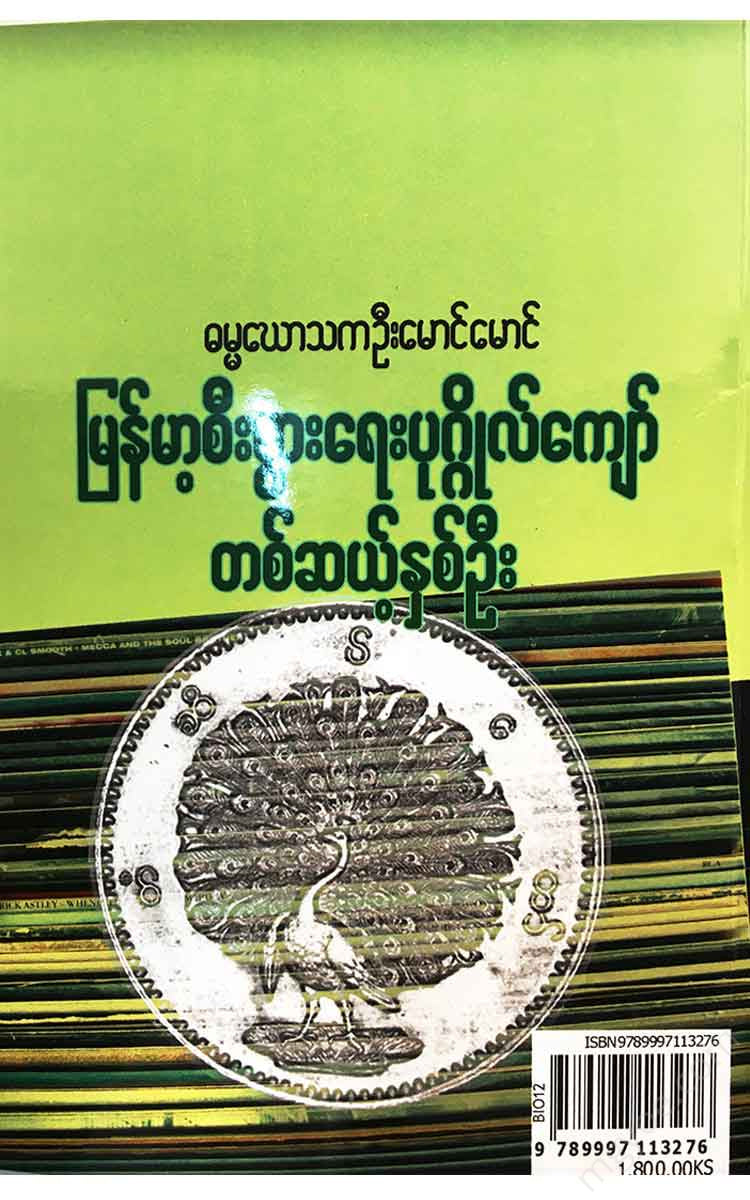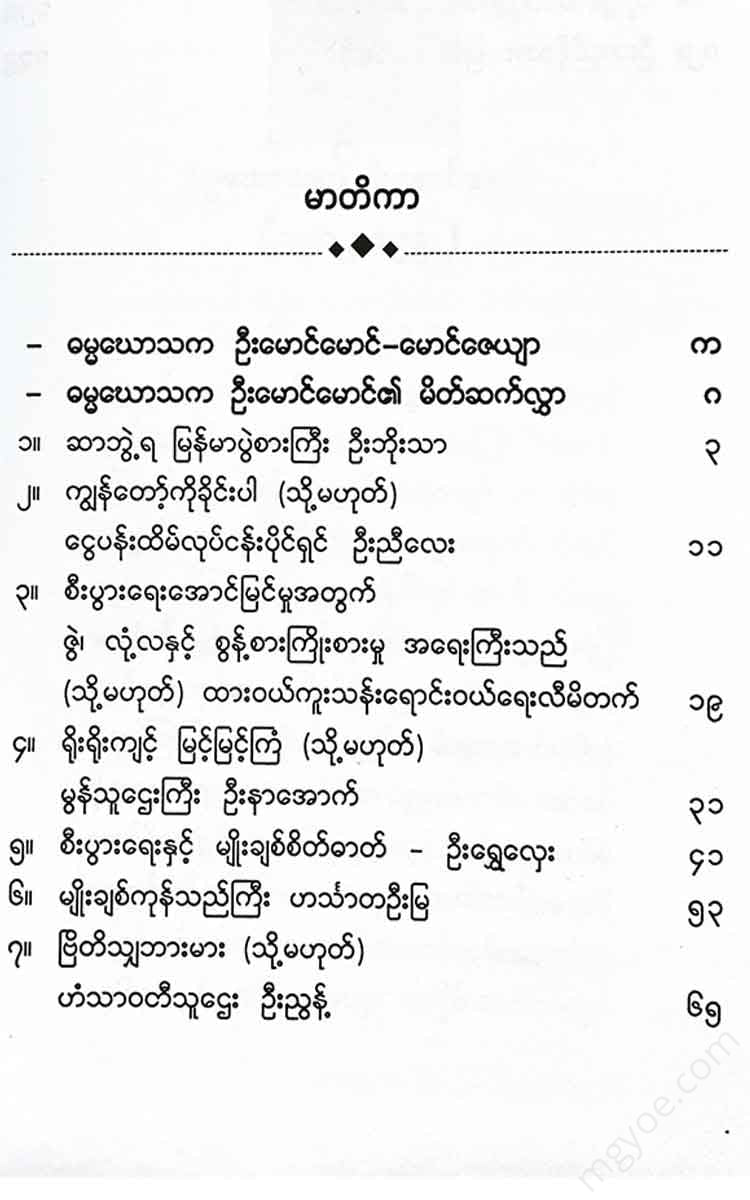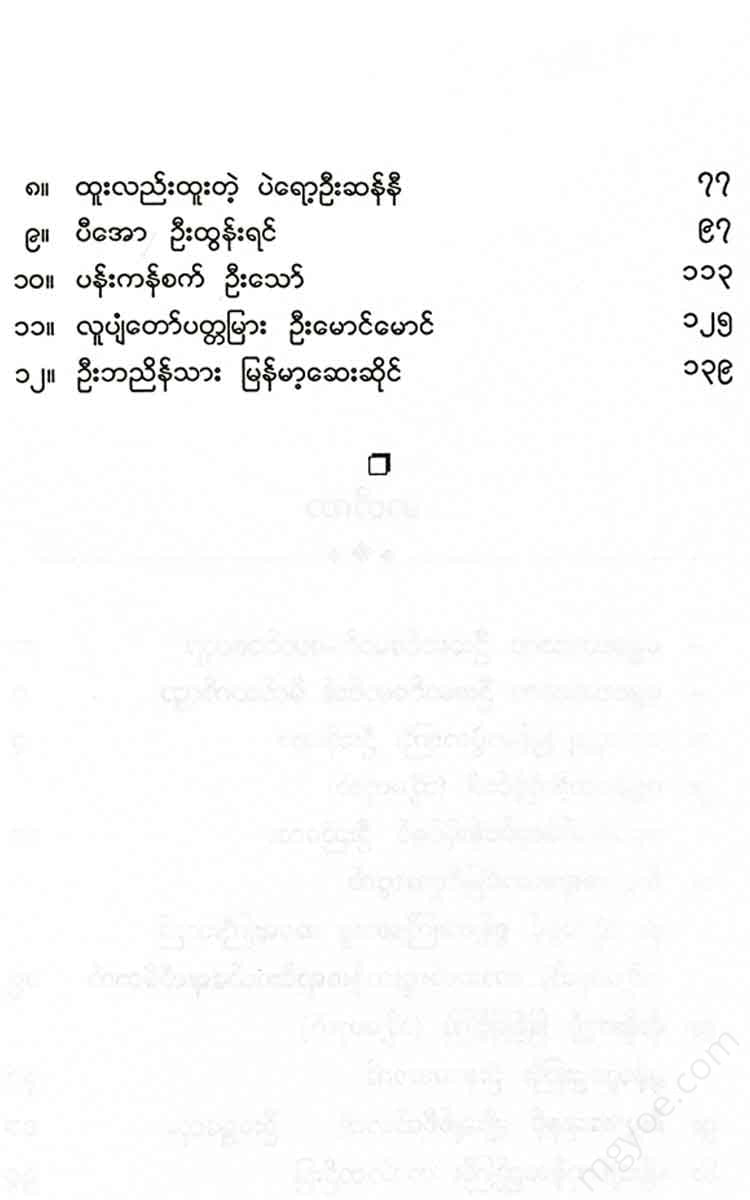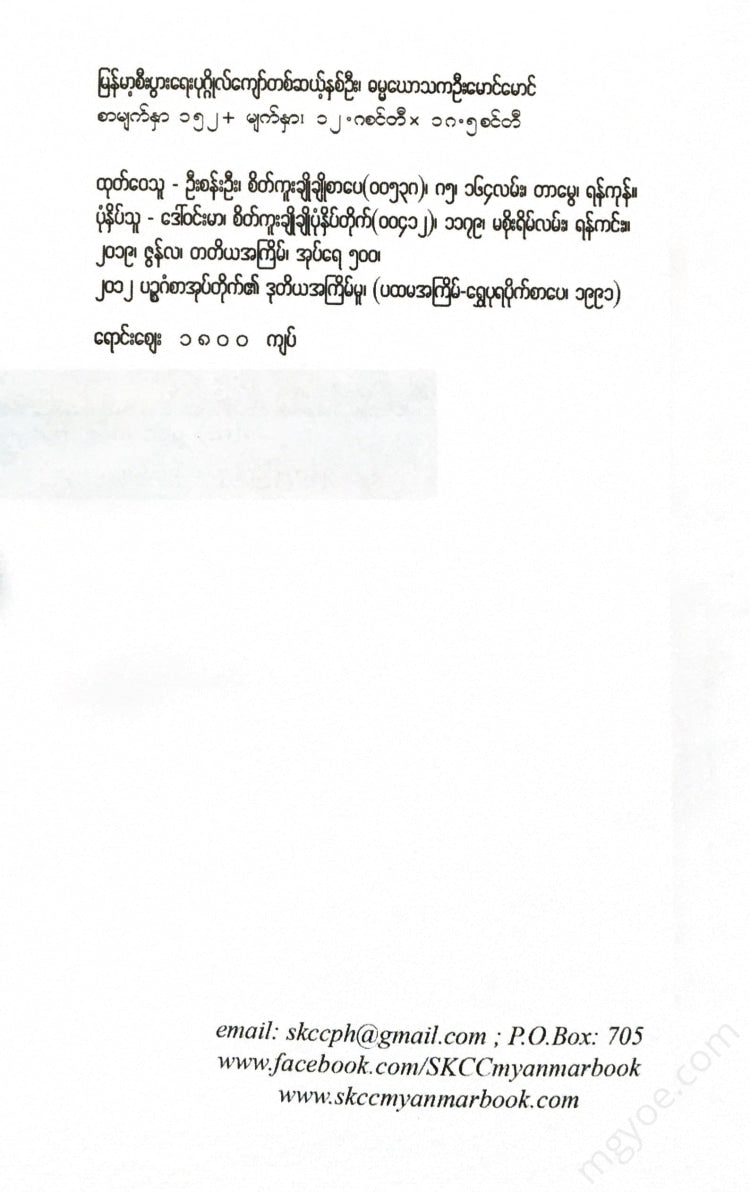စိတ်ကူးချိုချိုစာပေ
Dhamma Ghosaka U Maung Maung - Twelve Myanmar Businessmen
Dhamma Ghosaka U Maung Maung - Twelve Myanmar Businessmen
Couldn't load pickup availability
The author had many written and personal encounters with Burmese merchants before and after World War II. He wanted to briefly describe the achievements of this great man, but he found it difficult because there were no reliable records. Through hard work and research, he was able to write a piece of content. In describing a business person, he
(1) Must be a Burmese national.
(2) Must be a devotee of Buddhism.
(3) According to the Dhamma, one must live a life free from unwholesome deeds and be virtuous.
(4) Must have a national spirit.
The author writes with four "principles". The main goal of the author is to make the young generation aware of the great business figures of Myanmar who lived in the not-so-distant past. He writes with the good will that they may emulate the extraordinary work of these great individuals. He would like to express his gratitude to all those who helped him find the information.
May he be healthy and prosperous.
Dhamma Ghosaka U Maung Maung
19-3-91
"It's not about luck, intelligence, or hard work."
The attainment of time, the attainment of yoga, the attainment of intelligence, and
It also needs to be fulfilled.
The old man likes to meet good times.
Full of good deeds and diligence.
There is also insight, wisdom, and knowledge.
In harmony with these three elements,
The top was able to stand on both sides.
"Must remember"
U Bo Thar, a Burmese broker with a master's degree
“What I want to know is about Sa Bo Tha. Back then, they said that Sa Bo Tha was a prominent figure in the Burmese business world.”
“Yes, of course. There is a fair amount of information about him in the Myanmar Encyclopedia and in the book “Myanmar Myint Maung’s Mysterious Myanmar.” In fact, it would be good to write a book about an outstanding Burmese merchant called “Sa Botha At Kap Patti.”
"If there are any things that our youth can imitate or imitate, please tell me."
A brief history. U Bo Thar was an unremarkable village boy from Pha Ku Village on the banks of the Bago River, Thanlyin Township, Hanthawaddy District (Yangon Division). He was the eldest of six children of U Nyunt and Daw Dwey, and was born in the month of Taghu 1219 (1857 AD). As a child, he learned the basics of worldly knowledge at the village monastery. At the age of 20, he helped his parents with their rice farming. That was how U Bo Thar’s life began.
“Hansawaddy District is roughly a large agricultural area extending from Thanlyin, Kyauktan, Khayam, Thonkhwa, Kunchankone, Twante, and even to the eastern border of Bago District.”
"Yes. After the Ayeyarwady Delta, Bago and Hanthawaddy are the best rice producing areas in Myanmar. There are many rich Burmese landowners in that area who own thousands of acres of land. In such a prosperous area that depends on rice, U Bo Thar started his business as a rice broker in a rural village when he was in his 20s. Later, he became a Paddy King, a Paddy Magnate."
“ The time for good rice trading was right, the place was right, and when the time was right, he started his rice brokerage business,” he said.
“That’s right. After the construction of the Suez Canal in Egypt (1859-69), the country’s rice and teak trade with the West expanded significantly. So, U Bo Thar became a major rice broker for the big Western companies such as Steele Brothers, Black Brothers, Fairweather Richards Company, and ABC Company, which were prominent in the rice business. There were small rice brokers under him. He had to go to the provinces and buy rice, and store it. Then he would deliver it to U Bo Thar. U Bo Thar, in turn, would introduce it to the big companies. The big companies usually assigned U Bo Thar to buy rice.”
“Does U Boe Tha know how to speak and write English?”
“Back then, matriculation and college were not close to U Bo Thar. He seemed to understand only the ABCs. But U Bo Thar had a unique ability to connect with large Western companies and achieve success. Being able to speak and write English and being educated are not the main requirements. Being intelligent, hardworking, and having good character and integrity are the keys to success in the business world.”
"That's right, sir."
“The Myanmar Encyclopedia states that U Bo Tha was a prominent figure in the Burmese business world during the British era. He was upright, honest, intelligent, and had a knack for business profit. He became a leader in the Burmese business world due to his ability to work. He was recognized as one of the most skilled Burmese in the rice industry.”
“I must say that he is a great person worthy of respect.” “It is said that in U Bo Thar’s time, the market fee for a hundred baskets of paddy was only two kyats. However, since the baskets of paddy he bought were worth thousands and thousands of kyats, U Bo Thar’s income must have been in the thousands and thousands of kyats (in that era). As the rice business expanded, U Bo Thar and a group of friends formed a brokerage association in Yangon to compete with foreign traders, such as Chinese and black traders. It was called (Burmese Paddy Broker Society). 69:200 sqe. 69:003:09081 The peacock dancing above, the large boat carrying paddy in the middle, and the Burmese spirit of the Wandshar family are very evident.”
“Yes, of course. During the British era, there was a Chamber of Commerce. It was controlled by the English and European merchants. Burmese people had no place. Now, in the era of independence, there is a Chamber of Commerce and Industry on Bo Song Pat Street called the Burma Chamber of Commerce and Industry.”
“It is clear that U Bo Tha and his family were modern and progressive in the world of commerce about a hundred years ago. I think the youth of our time should also be interested in the world of business and strive to advance. In addition, U Bo Tha is a monk and is always at the forefront of religious, religious, and social issues.”
“U Bo Thar’s good deeds, such as the large pagodas, the Buddha statues, the pagodas, and the public hospitals in Insein, are many.”
Socially, he is often involved in both financial and human activities, such as being a counselor to the governor, a member of the Shwedagon Pagoda, and other prominent and important organizations. One thing that stands out is that he is a person who never refuses to donate. He is said to never hesitate to refuse anyone who asks for financial assistance, advice, or job assistance.
"I must say that he is a great person with a great attitude and good faith."
“Aye... For such generosity, the broker U Bo Tha (later Sir Bo Tha) was awarded the K.I.H. degree in 1917, the O.B.E. degree in 1919, the C.I.E. degree in 1923, and the highest degree of Sir (May) in 1927 by the British government. In those days, it was rare for a Burmese merchant who was not a government employee to receive such titles and honors. Maung Bo Tha, a young forest broker who had only been educated at a monastery in Pha Ku Village, Thanlyin Township, Hanthawaddy District, became a wealthy and prominent merchant in the country during the British era. Isn’t it commendable and surprising that U Bo Tha became a Sir (Sir) degree in the British government?”
"I must say that Sa Botha's past life was full of glory and merit."
“You can’t think like that, Brother Yin. The Buddha taught three things: karma, intelligence, and effort. Karma is not just about karma from past lives. There must also be karma in the present life. Karma is work, right? Present karma, present work, needs to be done with good intelligence and good effort.”
"I understand, sir."
“It is not in karma, knowledge, and effort. It is also necessary to be complete with the attainment of time, the attainment of yoga, and the attainment of intelligence. As I said earlier, the Buddha was lucky when the time came. He was complete with good diligence. He also had vision, wisdom, and knowledge. It must be said that he was able to stand at the top in all aspects because he was in harmony with these three elements.”
"Yes, he is a great person to emulate."
“Sa Botha passed away on August 26, 1933, at the age of 67. I pray that good sons like Sa Botha will emerge in the Myanmar economy.”
We are saddened by the recent passing of U Nyunt Tha (71), the youngest son of Sa Bo Tha, and U Aung Tha Kyaw, the owner of the Gandamala bakery, who helped with this article.
